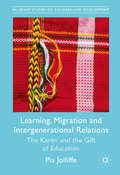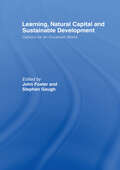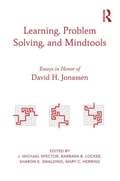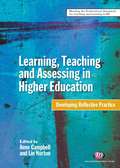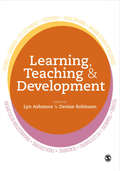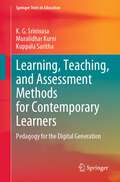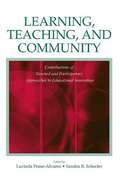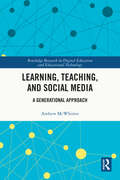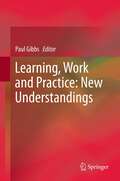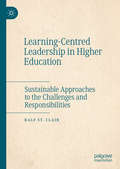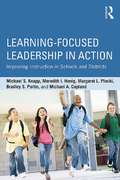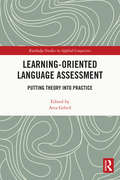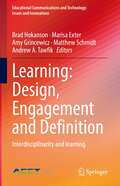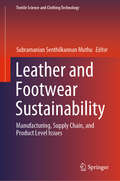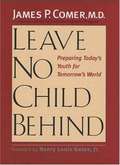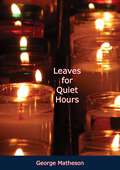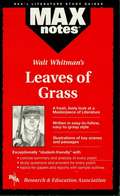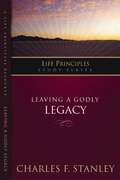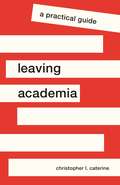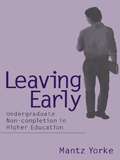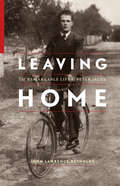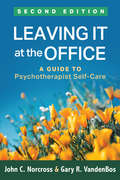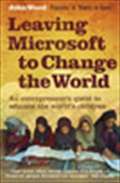- Table View
- List View
Learning, Migration and Intergenerational Relations
by Pia JolliffeFocusing on the Karen people in Burma, Thailand and the United Kingdom, this book analyses how global, regional and local developments affect patterns of learning. It combines historical and ethnographic research to explore the mutual shaping of intergenerational relations and children's practical and formal learning within a context of migration and socio-political change. In this endeavour, Pia Jolliffe discusses traditional patterns of socio-cultural learning within Karen communities as well as the role of Christian missionaries in introducing schooling to the Karen in Burma and in Thailand. This is followed by an analysis of children's migration for education in northern Thailand where state schools often encourage students' aspirations towards upward social mobility at the same time as schools reproduce social inequality between the rural Karen and urban Thai society. The author draws attention to international humanitarian agencies who deliver education to refugees and migrants at the Thai-Burma border, as well as the role of UK government schools in the process of resettling Karen refugees. In this way, the book analyses the connections between learning, migration and intergenerational relations in households, schools and other institutions at the local, regional and global level.
Learning, Natural Capital and Sustainable Development: Options for an Uncertain World
by John Foster Stephen GoughThis special issue of the journal Environmental Education Research addresses a topical area of importance - human behaviour towards the environment. The book explores the economic metaphor of 'natural capital' in this context arguing that the currently dominant model of sustainable development, underpinned by a particular understanding of this metaphor, is impeding progress towards genuine sustainability, and secondly that it will continue to do so until the metaphor can be reworked in both thought and practice.This book explores an alternative economic model of natural capital value, based on recent 'real options' thinking which reworks the natural capital idea and provides a framework for articulating two major and closely-related shifts of emphasis.
Learning, Problem Solving, and Mindtools: Essays in Honor of David H. Jonassen
by J. Michael Spector Sharon E. Smaldino Barbara B. Lockee Mary C. HerringLearning, Problem Solving, and Mindtools is inspired by the substantial body of learning research by David H. Jonassen in the areas of mind tools and problem solving. The focus of the volume is on educational technology, especially with regard to how new technologies have facilitated and supported problem solving and critical thinking. Each chapter focuses on a particular aspect of learning with technology and elaborates the implications for the design and implementation of learning environments and activities aimed at improving the conceptualization of problems, reasoning and higher-order thinking, and solving challenging problems. This collection of scholarly essays provides a highly engaging treatment of using tools and technologies to improve problem solving; multiple perspectives on integrating educational technology to support learning in complex and challenging problem solving domains; guidance for the design of instruction to support problem solving; a systemic account of the relationships between mental models, instructional models, and assessment models; and a look into the future of educational technology research and practice.
Learning, Teaching and Assessing in Higher Education: Developing Reflective Practice (Teaching in Higher Education Series)
by Anne Campbell Lin NortonThis is an up to date guide to teaching and learning in higher education, addressing issues raised by the Professional Standards Framework. It encourages the development of thoughtful, reflective teaching practitioners in higher education, and is useful for the review of existing courses. The authors and editors acknowledge the distinctive nature of teaching in higher education, explore a variety of creative and innovatory approaches, and promote reflective, inquiry-based and evaluatory approaches to teaching. The book supports the professional development of staff involved in teaching, supporting and assessing students.
Learning, Teaching and Development: Strategies for Action
by Denise Robinson Lyn AshmoreThis best practice guide to teaching in the Further Education and Skills sector, and professional organisational learning contexts, examines the key concepts underpinning effective teaching and learning and combines this with case studies which demonstrate meaningful connections between theory and practice. Each chapter also contains discussion questions, learning activities and reflective points, allowing you to further engage with key research and relate it to your own teaching. Offering pragmatic advice on learning design, support and delivery, coverage includes: Identifying learning needs and objectives Selecting and developing appropriate content Using technology to enhance learning Assessment, evaluation and reflection This is an indispensable resource for anyone preparing to teach in Further Education, current Higher Education lecturers and work-based learning trainers in private and public-sector organisations. Lyn Ashmore is a Senior Lecturer in the School of Education and Professional Development and Denise Robinson is Director of the Post Compulsory Education & Training Consortium, both are based at the University of Huddersfield.
Learning, Teaching, and Assessment Methods for Contemporary Learners: Pedagogy for the Digital Generation (Springer Texts in Education)
by K. G. Srinivasa Muralidhar Kurni Kuppala SarithaThis textbook tackles the matter of contemporary learners’ needs, and introduces modern learning, teaching, and assessment methods. It provides a deeper understanding of these methods so that the students and teachers can create teaching and learning opportunities for themselves and others. It explores the meaning of ‘pedagogy’, why it is essential, and how pedagogy has evolved to take 21st-century skills and learning into account. This textbook showcases various modern learning, teaching, and assessment methods for contemporary learners in an increasingly digital environment. Each chapter presents insights and case studies that show how such modern methods can be applied to classrooms, and how they can support the existing curriculum. It shows students, educators, and researchers alike how to effectively make sense of and use modern learning, teaching, and assessment methods in everyday practice.
Learning, Teaching, and Community: Contributions of Situated and Participatory Approaches to Educational Innovation
by Lucinda Pease-Alvarez and Sandra R. SchecterThis volume brings together established and new scholarly voices to explore how participatory and situated approaches to learning can contribute to educational innovation. The contributors' critical examinations of educational programming and engagements provide insights into how educators, youth, families, and community members understand and enact their commitments to diversity and equitable access. Collectively, these essays complicate notions of community, alerting readers to ways in which community can be constructed other than in geographical and ethnoracial terms--as alliances and collaborations of individuals joining together to accomplish or negotiate shared agendas. The focus on agency combined with social context, a dialectic to which all of the authors speak, enlarges and invigorates our sense of what is pedagogically possible in societies characterized by diversity and flux. *Part I, "Linking Pedagogy to Communities," focuses on dynamic initiatives where practitioners collaborate with community members and other professionals as they acknowledge and build on the cultural, linguistic, and intellectual resources of ethnic-minority students and their communities. *Part II, "Professional Learning for Diversity," centers on the authors' experiences in facilitating opportunities for working with prospective and practicing teachers to develop situated pedagogies, highlighting both the challenges that emerge and the transformations that occur. *Part III, "Learning in Community (and Community in Learning), illustrates how educational innovation can extend beyond the realm of schools and classrooms by elucidating ways in which individuals construct learning venues in out-of-school settings. Learning, Teaching, and Community: Contributions of Situated and Participatory Approaches to Educational Innovation is a compelling and timely text ideally suited for courses focused on teacher education and development, informal learning, equity and education, multilingual and multicultural education, language and culture, educational foundations, and school reform/educational restructuring, and will be equally of interest to faculty, researchers, and professionals in these areas.
Learning, Teaching, and Social Media: A Generational Approach (Routledge Research in Digital Education and Educational Technology)
by Andrew McWhirterEmploying a unique generational approach, this book critically assesses social media in educational contexts across all educational levels: from primary and secondary schools to further and higher education, proposing a schema for social media literacy (SML). Using research obtained from fieldwork observations conducted in online teaching groups, surveys, and in-depth interviews with teachers and educators on the topic of social media and education, chapters interrogate the historical relationship between educator and learner, and use the frame of expert methodology to understand what educators themselves consider important about social media and education relative to their sectors. Bringing together current literature from education, learning and media technologies, along with longstanding debates around technological influence, chapters also draw on audience and communication studies, psychology and arts and humanities at a time when many different disciplines are trying to understand what social media means to our society. This interdisciplinary volume will be of great interest to academics, researchers and postgraduates in the fields of technology in education, media literacy, and critical digital media. Practitioners involved in the sociology of education will also find the book of use.
Learning, Work and Practice: New Understandings
by Paul GibbsThis book's original contribution to a crowded literature on work and learning will attract strong international interest. Its focus on the philosophy of learning at work brings a fresh perspective on a topic normally viewed through psychological, anthropological and sociological eyes. It assembles a host of internationally recognized scholars who reflect on the various philosophies of work-based learning. Full of distinctive and original contributions that provide perceptive insights into the subject, the work will be a practical support to teachers, trainers and researchers at the same time as it gives readers a clear philosophical grounding in learning at work. It is, however, not simply a book about philosophy, but a gazetteer of approaches to education in work that will sustain and inspire those who provide, engage in, and support the learning of new knowledge and skills in the workplace. With adaptability to new employment opportunities so vital to existing workers, the authors stand behind continued provision of work-based learning in the face of tightening economic constraints.
Learning-Centred Leadership in Higher Education: Sustainable Approaches to the Challenges and Responsibilities
by Ralf St. ClairThis book explores the implications of focusing learning in university leadership. While a range of external and internal factors push contemporary higher education leaders towards a reactive and transactional style, the author argues that placing learning at the centre of the decision-making process ultimately grounds higher education leadership in values. Illustrated by numerous case studies and informed by Peter Senge’s theory of learning, the author examines this central thesis across a variety of areas and functions of higher education that are vital to the development and success of this shared endeavour. This book will be of interest and value to both new and established university leaders, as well as scholars of leadership in higher education more generally.
Learning-Focused Leadership in Action: Improving Instruction in Schools and Districts
by Michael S. Knapp Meredith I. Honig Margaret L. Plecki Bradley S. Portin Michael A. CoplandIn an educational context where school and district performance is of increasing focus, it’s essential for leaders at all levels of the educational system to focus on improving student performance. This volume zeros in on a promising set of strategies and practices for all leaders to motivate, support, and sustain learning in contemporary schools. Learning-Focused Leadership in Action explores what it means for educational leadership to be "learning-focused," what this looks like in practice at both the school and district level, and how such leadership changes can be set in motion. Drawing on extensive case study research in schools and districts that are making progress on learning improvement, this volume explores how leaders at all levels of the educational system can productively seek to improve the quality of learning opportunities and student performance, no matter how challenging the circumstances.
Learning-Oriented Language Assessment: Putting Theory into Practice (Routledge Studies in Applied Linguistics)
by Atta GebrilThis collection brings together research on learning-oriented language assessment from scholars working across geographic and educational contexts, highlighting the opportunities of assessment practices which seek to better align assessment and learning tasks and support effective learning. The volume begins by introducing learning-oriented assessment (LOA) and the context around its growing popularity, especially in accountability-oriented settings which favor summative large-scale tests. The first part of the book charts the development of LOA’s theoretical and conceptual underpinnings, outlining the ways in which they have been informed by theories of learning and key elements. The second part demonstrates LOA in practice, drawing on examples from different countries and instructional settings to explore such topics as the role of technology in LOA and developing feedback materials based around LOA principles and developed for core literacy skills.Offering a holistic view of learning-oriented assessment and the real-world affordances and challenges of its implementation, this book is key reading for graduate students, researchers, and practitioners in language testing and assessment, TESOL, and language education.
Learning: Interdisciplinarity and learning (Educational Communications and Technology: Issues and Innovations)
by Brad Hokanson Andrew A. Tawfik Amy Grincewicz Matthew Schmidt Marisa ExterThis book examines the topic of learning design from a human, interactive, and collaborative perspective. A variety of pedagogic and instructional modalities are thoroughly investigated as methodologies for creating functional and effective designs for students. The book is appropriate for all levels of teaching and learning, but special attention is paid to the special requirement of higher education, graduate education and post-graduate classrooms.Within the research chapters are embedded numerous examples, case studies, and implementation guides. The book is a scholarly yet practical guide to learning design and everyone from educational researchers in all areas of educational technology to instructional designers and instructional technologists will find it useful and inspiring at once.
Leather and Footwear Sustainability: Manufacturing, Supply Chain, and Product Level Issues (Textile Science and Clothing Technology)
by Subramanian Senthilkannan MuthuThis book examines the manufacturing, supply chain and product-level sustainability of leather and footwear products. This book deals with the environmental and chemical sustainability aspects pertaining to the tanning supply chain and the related mitigation measures. The book also explores interesting areas of leather and footwear sustainability, such as waste & the 3R’s and their certification for sustainability. At the product level, the book covers advanced topics like the circular economy and blockchain technology for leather and footwear products and addresses innovation development and eco-material use in footwear by investigating environmental sustainability and the use of bacterial cellulose, a potential sustainable alternative for footwear and leather products.
Leave No Child Behind: Preparing Today's Youth for Tomorrow's World
by James ComerThe call-to-arms to "leave no child behind" in America has become popularly associated with the Bush administration's education plan--a plan that actually diverges greatly from the ideals of the Children's Defense Fund, which originated the concept. Here, in a bold and engaging new book, Dr. James Comer reclaims this now-famous exhortation as a tool for positive and substantive change. Far removed from the federal government's focus on standardized testing as the panacea for our educational ills, Dr. Comer's argument--drawn from his own experiences as the creator of the School Development Program--urges teachers, policymakers, and parents alike to work toward creating a new kind of school environment. In so doing, Dr. Comer reignites a crucial debate as he details the evolution and many successes of his School Development Program since its inception thirty-five years ago, and he illustrates how his model for change has proven effective in public schools throughout the country. Most important, he offers proof that students from all backgrounds can learn at a high level, adopt positive behavioral attitudes, and prepare for a fulfilling adult life, if they learn in schools that provide adequate support for their complete development--schools that know that leaving no child behind should be much more than just a convenient political slogan.
Leave Rules Made Objective
by Muthuswamy Brinda SanjeevThe questions in this book have been framed in such a way that no rule is left untouched. All possible questions that can be asked from the CCS (Leave) Rules have been visualized and extracted by our team of assistant authors and incorporated in this book. The answers to the questions have been given as a key at the end of the book. For a detailed explanation of the key, readers are requested to go through the relevant Rule, Office Memorandum or GID, quoted against the Key, from Swamy s Compilation of FR & SR — Part-Ill— CCS (Leave) Rules.
Leaves for Quiet Hours
by George MathesonGeorge Matheson, a Scottish minister who spent decades in God’s service, discusses how Jesus set an example for all Christians, and what living a good, virtuous and spiritually sound life means.A provocative and resounding declaration of faith, Leaves for Quiet Hours begins with the author’s promise: to marry the insight of the thinker with the fervor of the worshipper. In so doing, George Matheson offers the reader a series of deeply thoughtful missives on what it is to be a Christian, how the deeds and words of Jesus remain of eternal significance, and how the development of consistent virtues is the mission of all true Christian believers.Designed to be read on a regular basis, this book introduces a strain of religious thinking in every chapter. The themes are commonly Biblical, with the New Testament’s lessons and ideas examined and presented for the reader’s own consideration. Matheson’s aim is to create a spark of contemplation, on the finer virtues of Christianity and life on Earth, and the sacrifice and wisdom of Jesus and his followers. While he was mostly known in life for his hymn writing, it is in this work that George Matheson reveals his ability as a fine author and scholar of spiritual matters.-Print ed.
Leaves of Grass (MAXNotes Literature Guides)
by Kevin Kelly Christine BergREA's MAXnotes for Walt Whitman's Leaves of Grass MAXnotes offer a fresh look at masterpieces of literature, presented in a lively and interesting fashion. Written by literary experts who currently teach the subject, MAXnotes will enhance your understanding and enjoyment of the work. MAXnotes are designed to stimulate independent thought about the literary work by raising various issues and thought-provoking ideas and questions. MAXnotes cover the essentials of what one should know about each work, including an overall summary, character lists, an explanation and discussion of the plot, the work's historical context, illustrations to convey the mood of the work, and a biography of the author. Each chapter is individually summarized and analyzed, and has study questions and answers.
Leaving A Godly Legacy (Life Principles Study Series)
by Charles F. StanleyHow to Raise Godly Children.You can be a godly parent and pass a good spiritual and emotional legacy to your children, regardless of what may have happened to you as a child. In Protecting Your Family, Dr. Charles Stanley points out the practical parenting advise to be found in the Bible and shows how such advice still applies to this generation and the next. With over 1 million copies sold, the Charles F. Stanley Bible Study Series is a unique approach to Bible study, incorporating biblical truth, personal insights, emotional responses, and a call to action. Each study draws on Dr. Stanley's many years of teaching the guiding principles found in God&’s Word, showing how we can apply them in practical ways to every situation we face.Each of the ten lessons includes:A brief look at what is covered in the lesson.A teaching from Dr. Stanley that unpacks the topic of the lesson.Application and Bible study questions based on the key points.Key takeaways to put into practice today and tomorrow.
Leaving Academia: A Practical Guide (Skills for Scholars)
by Christopher L. CaterineAn indispensable guide for grad students and academics who want to find fulfilling careers outside higher educationAn estimated ninety-three percent of graduate students in the humanities and social sciences won’t get a tenure-track job, yet many still assume that a tenured professorship is the only successful outcome for a PhD. With the academic job market in such crisis, Leaving Academia helps grad students and academics in any scholarly field find satisfying careers beyond higher education. Short and pragmatic, the book offers invaluable advice to visiting and adjunct instructors ready to seek new opportunities, to scholars caught in “tenure-trap” jobs, to grad students interested in nonacademic work, and to committed academics who want to support their students and contingent colleagues more effectively.After earning a PhD in classics from the University of Virginia and teaching at Tulane, Christopher Caterine left academia for a job at a corporate consulting firm. During his career transition, he went on more than 150 informational interviews and later interviewed twelve other professionals who had left higher education for diverse fields. Drawing on everything he learned, Caterine helps readers chart their own course to a rewarding new career. He addresses dozens of key issues, including overcoming psychological difficulties, translating academic experience for nonacademics, and meeting the challenges of a first job in a new field.Providing clear, concrete ways to move forward at each stage of your career change, even when the going gets tough, Leaving Academia is both realistic and filled with hope.
Leaving Early: Undergraduate Non-completion in Higher Education
by Mantz YorkePresents the findings of new research into the problem of students dropping-out from their courses, and provides information that will help institutions understand and address the problem. The book clarifies definitions of non-completion, looks at what influences students to leave early, assesses the implications for the institution's performance and the costs to the public purse. The analysis is illustrated by examples of student experience, and highlights courses of action that may help to reduce the problem.
Leaving Home
by John Lawrence ReynoldsPetro (Peter) Jacyk survived two of the most horrendous events of the 20th century: the Ukrainian famine of the 1930s, instigated by Stalin and responsible for the deaths of untold millions, and waves of invasion and slaughter from Soviet Russia and Nazi Germany. Fleeing postwar Europe in 1949, he arrived in Canada with seven dollars in his pocket and horrific images in his memory. His adopted country would inspire a deep and lifelong love in Jacyk. Here at last, as he put it, he was "free to live and free to succeed." Through the Toronto building and land development firm he founded, he established himself as an economic and cultural powerhouse. Exacting in his dealings with others, yet a generous mentor, he sought excellence in all of his pursuits. In time, the man who had begun as a "poor-penny immigrant" became one of the country's most prominent philanthropists, donating substantial portions of his wealth to projects dedicated to Ukrainian history, language, and culture. Universities such as Harvard, Columbia, and the University of Toronto benefited from his largesse. Leaving Home celebrates the life of a remarkable man determined to make a positive impact on an often-hostile world.
Leaving Home (Sweet Valley High #38)
by Francine Pascal Kate WilliamJessica is trying to stop Elizabeth from going to Switzerland for boarding school, because she's worried she'll lose her best friend. Meanwhile, Elizabeth is worried that Jeffrey and Enid are getting a little too close as they work together to make a scrapbook for her.
Leaving It at the Office, Second Edition: A Guide to Psychotherapist Self-Care
by John C. Norcross Gary R. VandenBosMental health professionals provide better care to their clients when they care for themselves. This highly practical guide--now revised and expanded with even more self-care strategies--has helped thousands of busy psychotherapists balance their personal and professional lives. The book presents 13 research-informed self-care strategies and offers concrete methods for integrating them into daily life. Featuring examples and insights from master therapists, every chapter concludes with a self-care checklist. Infused with a positive message of self-renewal and growth, the book shows clinicians how to leave distress at the office and tend actively to their physical, emotional, and spiritual needs. New to This Edition *Chapter on mindfulness and self-compassion. *Increased emphasis on simple, real-time self-care activities. *New examples from additional master therapists and hundreds of workshop participants. *Up-to-date research findings on therapist stress and resilience. *Discussions of competence constellations, building on self-care strengths, moral stress, deliberate practice, presession preparation, journaling, and multiculturalism.
Leaving Microsoft to Change the World: An Entrepeneur's Odyssey to Educate the World's Children
by John E. WoodsA trip to Nepal convinced Wood to divert the energy he was devoting to Microsoft into a cause that needed addressing - educating all children
